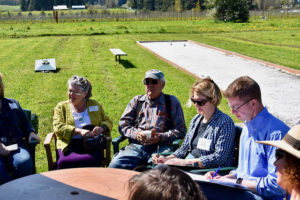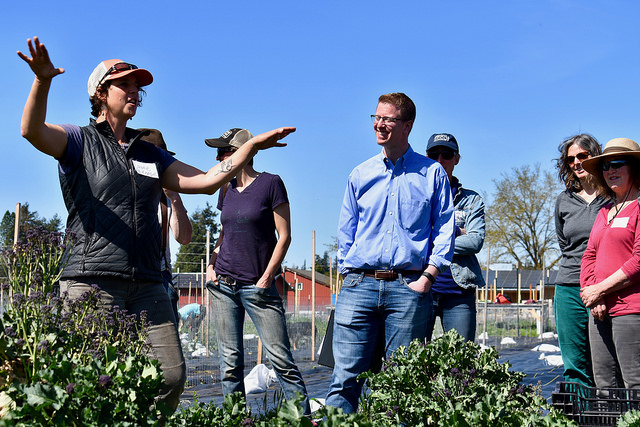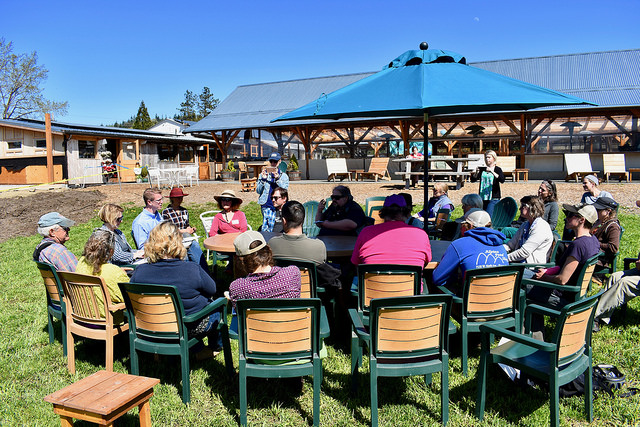
Update (6/26/18): The Senate is expected to vote on its version of the farm bill this week. We’re dismayed that the House passed its horrible version last week but are encouraged by many gains in the Senate, including more funding for organic agriculture research. Learn more about the Senate and House versions of the farm bill, what comes next, and how you can help advance a farm bill that supports sustainable agriculture and healthy food systems and communities.
Congressman Derek Kilmer (WA-6) visited the OSA Research Farm in Chimacum, WA, on April 23 to hear what farmers in his district think of the draft 2018 Farm Bill, which was recently released by the House Committee on Agriculture on a partisan vote. The full Congress is expected to debate the bill later this month.
Rep. Kilmer also saw firsthand how organic research funding authorized in the last Farm Bill has helped local farmers through OSA’s research on new cultivars. During a field tour that preceded a roundtable discussion, farmers and Rep. Kilmer munched on purple sprouting broccoli (PSB), an early vegetable developed by OSA to extend the season for market growers. Janet Aubin, Farm Manager of Finnriver Farm, noted that PSB is especially important for farmers trying to renew restaurant relationships prior to warm season production.
The group gathered for a roundtable discussion in a field overlooking the Finnriver orchard, with the Olympic foothills for a backdrop. Jefferson and Clallam County farmers explained how Farm Bill programs have fueled the vibrant local foods and agriculture economy in our region — helping to create new businesses, employ hundreds, and provide organic food to every sector of the population. Farmers growing near sensitive natural resources of the Olympic Peninsula and those keeping long-time family farms from being developed were particularly concerned with any reduction in conservation stewardship funding. The loss of cost share reimbursements for organic certification expenses could cause some farmers to let their certifications lapse, several farmers confirmed. The elimination of SNAP program credits, which make local vegetables accessible to families who need them most and are an increasingly important part of farmers market sales, raised the ire of several farmers, including Kia Armstrong of Nash’s Organic Produce in Sequim. John Bellow of Spring Rain Farm in Chimacum decried the shift in federal priorities away from funding small-scale farmers and toward creating loopholes for large organic operations.
The Congressman told the farmers that he can see the positive impacts Farm Bill programs have had in his district. Rep. Kilmer is a member of the Organic Caucus and a co-sponsor of both the Organic Agriculture Research Act and the Seeds for the Future Act. He told the farmers in attendance that the committee version of the Farm Bill is not likely to go far.
When farmers asked what more they can do, Congressman Kilmer encouraged them to call their friends in other congressional districts to ask their representatives to support a Farm Bill that reinstates and promotes these vital programs for local farms. Learn more about the House Agriculture Committee’s Farm Bill by reading this summary from our friends at the National Sustainable Agriculture Coalition.
The Farm Bill funds U.S. Department of Agriculture programs and is authorized every five years, distinct from other budgetary legislation. This September, the 2014 Farm Bill will expire if Congress does not authorize a new Farm Bill or vote to continue funding at 2014 levels.



